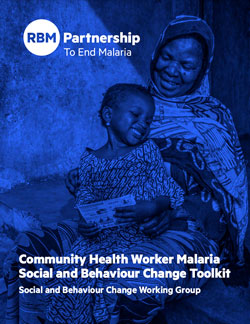Community Health Worker Malaria Social and Behaviour Change Toolkit
The Community Health Worker Malaria Social and Behavior Change Toolkit, developed by the RBM Partnership to End Malaria Social and Behaviour Change Working Group in collaboration with Breakthrough ACTION, provides high-level guidance to incorporate social and behavior change (SBC) content into community health worker (CHW) training and materials. It is designed to be adapted by national malaria programs, implementing partners, and other stakeholders. It is not a training guide or a training manual for CHWs; rather, the content of this toolkit can be added to CHW training to cover essential aspects of SBC for malaria and enhance the work of CHWs. The individual modules in this toolkit can be used selectively for specific circumstances or adapted to meet country or regional needs.
Objectives
The toolkit provides CHW trainers with resources to help CHWs:
- Distinguish between social and behavior change (SBC) and social and behavior change communication.
- Identify behavioral factors and their roles in influencing malaria behaviors among community members.
- Identify and integrate SBC approaches into regular community activities to strengthen the uptake and maintenance of malaria prevention and treatment behaviors.
- Understand how to use monitoring and supportive supervision data to improve the quality of care.
La boîte à outils pour le changement social et comportemental des agents de santé communautaires, développée par le groupe de travail sur le changement social et de comportement du Partenariat RBM pour en finir avec le paludisme en collaboration avec Breakthrough ACTION, fournit des conseils de haut niveau pour intégrer le contenu du changement social et de comportement (CSC) dans la formation et le matériel des agents de santé communautaires (ASC). Il est conçu pour être adapté par les programmes nationaux de lutte contre le paludisme, les partenaires de mise en œuvre et les autres parties prenantes. Il ne s’agit pas d’un guide ou d’un manuel de formation pour les ASC. Le contenu de cette boîte à outils peut être ajouté à la formation des ASC afin de couvrir les aspects essentiels du CSC en matière de paludisme et d’améliorer le travail des ASC. Les différents modules de cette boîte à outils peuvent être utilisés de manière sélective dans des circonstances spécifiques ou adaptés pour répondre aux besoins d’un pays ou d’une région.
Objectifs
La boîte à outils fournit aux formateurs d’ASC des ressources pour aider les ASC à:
- A faire la distinction entre le changement social et de comportement (CSC) et la communication pour le changement social et de comportement.
- Identifier les facteurs comportementaux et leur rôle dans l’influence des comportements liés au paludisme parmi les membres de la communauté
- Identifier et intégrer les approches CSC dans les activités communautaires régulières afin de renforcer l’adoption et le maintien des comportements de prévention et de traitement du paludisme.
- Comprendre comment utiliser les données de suivi et de supervision pour améliorer la qualité des soins.
Last modified: April 17, 2024
Language: English
Source: Johns Hopkins Center for Communication Programs
Year of Publication: 2024

